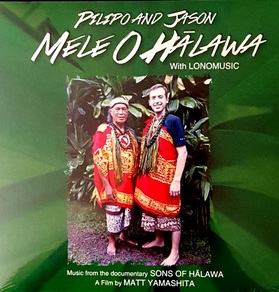
The film documents 'Anakala (Uncle) Pilipo and his life on the island of Molokai. He is the last to hold the cultural traditions, music, and stories of the sacred Hawaiian valley of Hālawa - home to his family for hundreds of years.
At age five, Pilipo was selected by his adopted grandfather to become the cultural practitioner for his family, and was given the responsibility of perpetuating the traditions of Hālawa Valley. But growing up in the isolated community was not easy and Pilipo, like most others of his generation, left Hālawa vowing never to return. However, when he got married and started a family, the valley and the teachings of his grandfather called him home to fulfill his destiny. The film follows Pilipo as he guides and talks with his son, Greg, and his two hanai (adopted) sons (Josh, a taro farmer, and Jason, a musician from New York). Which one will take on the responsibility of carrying the traditions forward? Or will all three play a role? If Pilipo doesn’t succeed in finding a successor, generations of knowledge will be lost forever.
Comments from actor Jason Scott Lee (Dragon-The Bruce Lee Story, Jungle Book, Rapa Nui, Lilo & Stitch, etc.), who is also a hanai son to Pilipo: "Matt Yamashita and crew have created something very special with Pilipo "Pops" Solatorio's life story. Taking us on a ride back in time on one of our most cherished islands, Molokai, we experience hardship, history, and Aloha through the voice and eyes of Pops. This heartfelt, graceful portrayal allows us a well-deserved "Ha" (Breath of Life) as a break from the fast-paced, hectic, techno world most of us live in.”
About the film and the CD, Jason Poole had this to say:
“The songs included on the CD are really special to ʻAnakala Pilipo [whom Jason calls Pops]. They are a link to the past, his past. Growing up in Hālawa Valley, he heard these songs sung by his relatives and neighbors. Without television and other “modern day” devices, music was a huge part of the daily life in the valley. He says that he’s the oldest living descendant of his generation still living in the valley. (Note: He may be the oldest living Hālawa native in the valley—maybe on the whole island. I would have to verify that.)”
“He was so excited to share them with me. And I was so excited to learn them!”
“Music was my way in when it came to all things Hawaiian. I fell in love with the music first. And when I went to Molokai to spend time with Pops back in 2007, my goal was this: to learn some songs that were “standards” on the island of Molokai. (I secretly hoped that he would share songs that were from Hālawa Valley, but I wasn’t sure.)”
“And now we have a recording of both Molokai standards as well as songs specifically from Hālawa Valley.” [Six of the songs on the recording are original compositions by Pops, Lono, and Jason]
“Lei Hālawa has become a theme song for me. It’s the song I use to open a concert or a talk-story session. It’s an instant connection to Molokai, to Hālawa Valley and to Pops, himself. I only know of one other recording (recorded by the Molokai Trio on their album Aloha Molokai) that features the song. I was so excited to hear it, sure that it would be an instant favorite. I was so wrong! It took a long time for me to cleave to it. But now it’s a favorite, for sure. The lyrics are based on a traditional oli that describe some of the sites in Hālawa Valley. The melody was borrowed from a Christian tune composed by James McGranahan. The same melody was used for Rev. Lorenzo Lyon’s song Hawai’i Aloha.”
“I know that ʻAnakala Pilipo feels the need to leave a legacy for future generations—especially because he is the only one who is living in the valley and perpetuating the cultural traditions he grew up with. This recording is a way to preserve that mana, that energy that’s been gathering for centuries.”
“I love the scene in the documentary when Pops hears the CD for the first time. He and Lono are sitting in the valley in ʻAnakala’s hale ʻike (learning house). The music fills the air and ʻAnakala’s eyes fill with tears. It’s like he’s listening to his ancestors singing again.”
“Being a part of this project is one of the greatest things I’ve done in my life. I see this as a way for ʻAnakala Pilipo and I to be connected forever. Our voices weave in and out of each other on the CD. Sometimes it’s even difficult to discern who is singing what. And for me, being an outsider who has been lovingly brought inside Hawai’i—inside a Hawaiian family via hānai—it brings me into this legacy. And it brings me in through a door that I’m familiar with, a medium that I trained in.”
“As a Kumu Hawai’i in this line of teachers, it’s an honor to be a part of this island’s (and this valley’s) rich musical tradition. An honor to be a carrier of its traditional songs, as well as link in the chain of the island’s (and valley’s) composers.”
The CD is available online at Me Ke Aloha while supplies last. The film has been shown at the Hawai’i International Film Festival, with screenings on the islands of O’ahu, Hawai’i, Kaua’i, Maui, and of course, Molokai, and the producers are hoping to enter it in other film festivals on a wider scale.
Below is the film’s official trailer, the music video for Jason’s original song “Healing Waters”, and some song clips from the CD.

 RSS Feed
RSS Feed